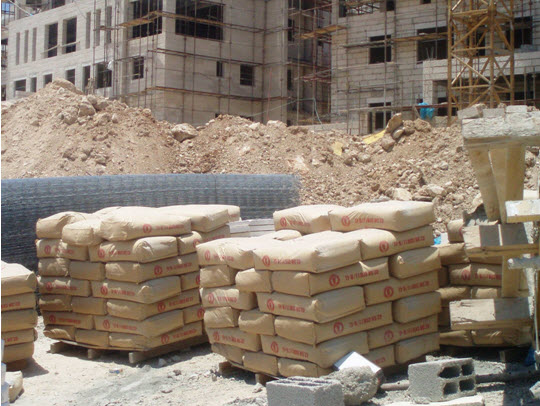Nesher Cement Reaps Huge Profits
The last major Israeli attack on the Gaza Strip in 2014 (“Operation Protective Edge”) left at least 2,300 Palestinians killed and 17,000 homes destroyed, rendering over 110,000 people homeless and turning much of the enclave to rubble. In the aftermath of Israel’s blatant violations of International Humanitarian Law, the already existing humanitarian crisis in the besieged Gaza Strip has been exacerbated. According to Who Profits, “not only did Israel manage to avoid accountability measures, but it has also benefited economically from the ruins it has caused.” The case study of Nesher, the sole Israeli cement producer, shows how the Israeli construction market is profiting from the destruction Israel caused in the Gaza Strip.
In September 2014, the UN trilateral agreement between the UN, Israel, and the Palestinian Authority (PA) provided a temporary normative framework for reconstruction in Gaza. This agreement declared itself a means to ease the closure and human suffering in the Gaza Strip, while simultaneously providing Israel with security and a means to monitor the movement of aid, namely construction goods and materials. If construction materials had been allowed by Israel to enter the Gaza Strip in the quantities needed, the World Bank estimated that last year the West Bank and Gaza Strip would have seen growth in their respective GDPs of more than 4% and 11%.

Bags of Nesher cement at a construction site in the Har Homa settlement neighborhood in occupied East Jerusalem (Photo: Who Profits)
Agreement Conditions Plus Nesher’s Monopoly Make It the Only Game in Town
However, in practice, the UN-sponsored agreement has both perpetuated the Israeli regime of control and restriction over the Gaza Strip and institutionalized a profitable reconstruction industry for Israel. As Israeli authorities are the only ones to decide which construction materials are permitted to enter the Gaza Strip, the agreement has resulted in Israel’s increasing its profits by ensuring that construction materials and assistance are sourced from Israel and benefit the Israeli economy.
Consequently, the Palestinian economy is now snared in an even tighter Israeli grip than was previously the case. In fact, the gross estimate of the PA for reconstruction efforts in Gaza stood at US$ 7.8 billion in 2014. This includes $2.5 billion for the reconstruction of 17,000 homes and $250 million to rebuild Gaza’s sole power plant, also destroyed during the 2014 attack.
Nesher Israel Cement Enterprises, Ltd. is a manufacturer and supplier of cement and clinker products for the construction industry. It also engages in manufacturing cement bags, quarrying and producing of white chalk and truck transportation. The company holds a monopoly over the Israeli and Palestinian cement markets. Since the company sells more than 85% of all cement in Israel, it is safe to assume that the Separation Wall and most, if not all. of the West Bank checkpoints, settlements, and Israeli infrastructure in the Occupied Palestinian Territories are built with Nesher cement.
Products of the company are ever-present in construction sites in the West Bank settlements of Alfei Menashe, Kedumim and Ma’ale Adumim and in the Har Homa settlement neighborhood in occupied East Jerusalem. Nesher cement bags were also documented during the construction of the Jerusalem light rail, a transportation project that connects the settlement neighborhoods of East Jerusalem with the city center.
The West Bank and the Gaza Strip constitute a captive market for Nesher cement and a source of large-scale revenues. Moreover, the company has actively tried to block Jordanian competitors from operating in the Palestinian market. It has done so through claims of “price dumping” allegedly introduced by Jordanian exporters and continues to do so through the presence of Nesher personnel conducting surveillance at Allenby Bridge border crossing.
With regards to reconstruction efforts in the Gaza Strip, Nesher has been reaping enormous profit in the framework of the UN-sponsored agreement. As the sole Israeli cement provider, Nesher holds a monopoly over the Israeli market, and has thus been able to secure economic gains and corporate growth through its exploitation of the ruins of Palestinian homes from the last Israeli attack on the Gaza Strip. In recent months, massive quantities of Nesher cement have been seen at reconstruction sites throughout the Gaza Strip.
Related:
http://www.whoprofits.org/content/reconstruction-gaza-zero-buildings-massive-profit


